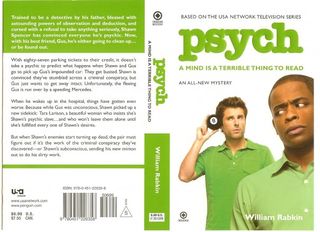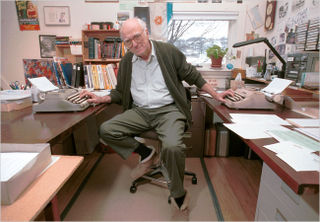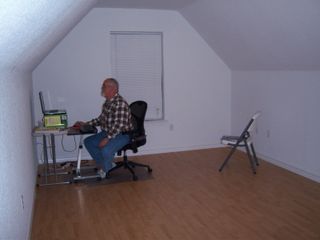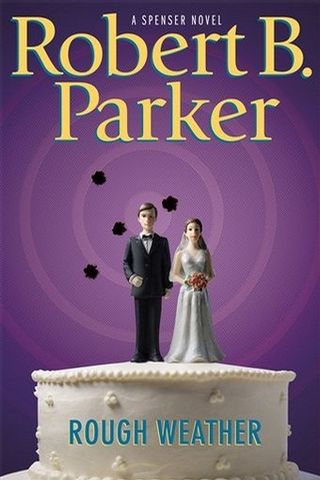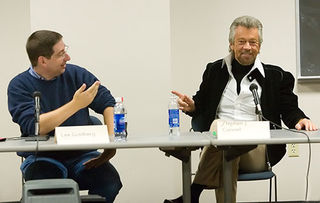
Every time I do a signing with Steve Cannell, it's reliving a dream. I grew up admiring him and his writing on shows like THE ROCKFORD FILES and THE A-TEAM…and I dreamed of working for him someday. He had the career that I wanted…and the talent, too. I didn't think that working with him was a real possibility but I knew I could learn from him anyway.
While I was in high school, I covered the television business for The Contra Costa Times (in Walnut Creek, CA) and came up with lots of excuses to do phone interviews with him, never once revealing that I was only 16-years-old or that I had any desire to be a TV writer. I know he liked the articles that I wrote because he told me so…and, more importantly, he never failed to return a call and was always available for a quote if I needed one.
I was still freelancing for the newspaper…and for a number of other publications…when I went down to Los Angeles to attend UCLA. I called him for an article about TENSPEED AND BROWNSHOE (or was it GREATEST AMERICAN HERO?) and I must have mentioned that I'd moved to L.A. because he invited me to his office at Samuel Goldwyn Studios. I was terrified. I was sure that once he saw I was a kid, he'd think I was a fraud and never talk to me again. But I couldn't resist the opportunity to actually meet him.
He did look shocked when I walked in the door, and I think for a moment he was afraid I was going to pitch him for a script, but I started off with a tough question about his decision to go into business for himself and the interview went great after that. Whatever awkwardness either one of us felt quickly evaporated and we talked for a couple of hours. (I know now, after talking with him about that day, that I proved to him with that question that I was a serious journalist and not someone who'd been running a long scam to get into his office). It was a wide-ranging interview about the business, about the risks he was taking leaving Universal, and it was one of the best interviews I'd ever done. In fact, it was one of the clips that got me a job as a reporter for Newsweek.
I interviewed him many more times over the years for various articles for a bunch of publications (the best was a huge profile in the trade magazine Electronic Media, now know as Television Week). I eventually gave up reporting and, through a lucky break, become a TV writer with William Rabkin. We sold a few freelance scripts and then got offered our first staff job… on HUNTER, a Stephen J. Cannell Production. It was fate.
Unfortunately, by that point, Steve had a "hands off" relationship with the show, which was then being run by Fred Dryer and Marv Kupfer. Even so, I'll never forget the fantastic feeling the first day I walked into the Stephen J. Cannell productions building as one of the writers instead of a reporter. It was amazing. A day or two later, I ran into Steve in the hallway. He thought I was there for an interview and he started to apologize for forgotting the appointment…I was thrilled to tell him that no, I wasn't there for an interview…I was working for him. He smile and gave me a hug.
Sadly, because of the situation at HUNTER, I didn't actually work with Steve at all…I only bumped into him now and then. The job also didn't last long …. we ended up quitting and getting hired onto BAYWATCH…but that's another story.
The HUNTER experience didn't tarnish my relationship with Steve at all. We saw each other at industry events and he was always amazingly friendly. And as it turned out, a few years later I was back at Cannell again as a supervising producer
on the syndicated series COBRA and, much to my pleasure, I actually got to work closely with him this time. He also used to pop into my office to share bits and pieces of a novel he was working on….which became THE PLAN.
We've remained friends ever since – and have signed together and spoken on panels with each other many times in many cities over the years. (Bill & I even had the amazing thrill of hiring him as an actor in a script we wrote for DIAGNOSIS MURDER…he played a burned-out TV producer of action shows…who becomes an actor!). But every time we get together, I am reminded how lucky I am to have achieved one of my dreams and to be able to count Steve among my friends. I hope the thrill never dies.
What brings all of this to mind? I'll be signing and talking TV writing with Steve Cannell…and with Bill Rabkin…on January 24th. The info is below.
Saturday, January 24 at 3:00 p.m.
HOORAY FOR HOLLYWOOD!
STEPHEN J. CANNELL, LEE GOLDBERG and WILLIAM RABKIN discuss and sign their books
It's an all-star event at The Mystery Bookstore, as we welcome not one but three writers who have made their marks as TV screenwriters as well as novelists.
Stephen J. Cannell, creator of "The A Team" among other shows, will discuss and sign ON THE GRIND (St. Martin's, $25.95), his ninth Shane Scully adventure; as the book begins, Scully is not only fired from the LAPD, but also kicked out by his wife. The reason for both is a movie actress, Tiffany Roberts, who'd been looking for a hit man to kill her husband. As Scully starts a new job with Haven Park, the most corrupt police department in California, we learn more about his connection to Tiffany Roberts.
Veteran screenwriter Lee Goldberg will discuss and sign his seventh Monk novel, MR. MONK IS MISERABLE (NAL hardcover, $21.95), based on the award-winning TV series. Everyone's favorite obsessive-compulsive detective lands in Paris, which is bad enough, but then winds up in a sewer museum – where he finds a fresh skull.
Goldberg's longtime writing partner, William Rabkin, will discuss and sign PSYCH: The Mind is a Terrible Thing to Read (Signet paperback original, $6.99), the first novel based on the hit USA Network series. Phony psychic/real detective Shawn Spencer agrees to lend his psychic powers to his old high school rival, Dallas Steele; Dallas wants Shawn to pick some investments for him. The investments turn out to be busts, but when Dallas winds up murdered, Shawn's detective talents are essential.
The Mystery Bookstore
1036-C Broxton Ave.
Los Angeles, CA 90024
phone: 310/209-0415 or 800/
821-9017
fax: 310/209-0436
http://www.mystery-bookstore.com
orders@mystery-bookstore.com



